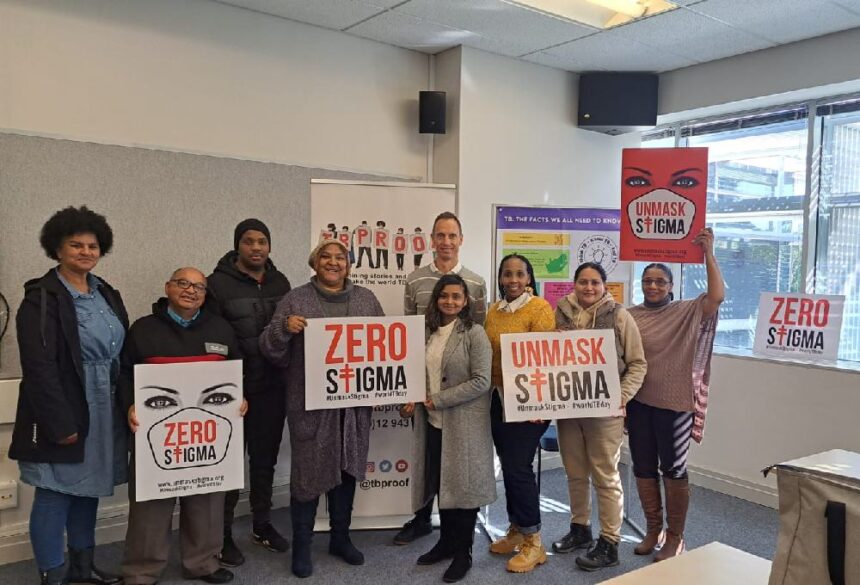By Candy Jacobs, TB Proof
Every day, 148 people in South Africa die from tuberculosis (TB). TB is a preventable and curable disease, yet it continues to disproportionately affect vulnerable communities. Beyond the appalling mortality statistics, TB poses a variety of challenges – lack of awareness, stigma, competing health worker demands and difficulties in accessing health care, with the result that many people infected with TB do not get diagnosed or treated.
Tackling these issues requires a “whole-of-society” approach, where every South African has a role to play – we all know someone affected by TB. Therefore, we must look beyond health facilities and prioritise community-based strategies that complement person-centred TB care.
In high-burden TB areas of the Western Cape, such as Delft and Elsies River, local leaders and health committees are already playing a vital role in raising TB awareness and improving access to services.
In partnership with TB Proof, individuals with lived experience of TB – or a passion for health justice – are working to strengthen the implementation of national TB policies.
Community leadership and TB champions
Health workers remain central to testing and treatment. But trusted community members are uniquely positioned to raise awareness, encourage testing, support prevention, and reduce stigma where they live and work. To strengthen these efforts, TB Proof launched the TB Champions initiative in August 2023, equipping local leaders with TB knowledge, communication skills, and advocacy tools.
The TB Champions attended a series of workshops over six months, covering content related to TB and national TB policies. With ongoing mentorship and support from TB Proof, they began putting their knowledge into practice in January 2025. Since then, they have led education campaigns across clinics, schools, workplaces, and faith-based settings.
They hosted 12 events and partnered with local organisations to offer on-site TB testing, while raising awareness about TB’s airborne transmission and the importance of testing close contacts. Their work has led to earlier diagnosis and reduced community transmission.
As of July 2025, the Champions remain active, with TB Proof continuing to provide support as they lead monthly TB testing campaigns in partnership with Delft CHC, alongside other ongoing community engagement activities.

For many TB Champions, this work is deeply personal. They are making a difference in their communities, driven by their own experiences or the experiences of those close to them. Each Champion brings unique strengths to the fight against TB, using their skills and voices to educate, advocate, and inspire action.
Tracey Visagie from Delft works to ensure that people living with HIV are tested for TB and re-linked to HIV care. “I got them a referral, and they got tested and back onto their meds,” she says. “Now I speak about TB wherever I go – at schools, church, even court.”
Daniel du Plessis from Elsies River uses his powerful voice to advocate for testing. “When I speak – even preach – people hear me. Many come back with questions. That’s how I know they’re thinking and talking about TB.”
Bravo Thompson from Delft is a TB survivor who addresses stigma directly. “TB is often seen as a death sentence. But the more we talk, the more we break down the shame.” His openness has helped others seek care.

These stories highlight how TB Champions are driving change, from improving access to care to breaking down stigma and encouraging open conversations about TB in a variety of settings. Their efforts are a testament to the power of community leadership in the fight against tuberculosis.
The untapped potential of health committees
Clinic and health committees are trusted, representative community bodies uniquely placed to advocate for improved services and educate the public on TB and other health issues. These groups organise door-to-door campaigns, host dialogues, and advocate for better care by voicing community concerns to facility management.
But their potential is constrained. Many members are unpaid volunteers, working without structured support. Yet they remain committed health activists, often the first to see gaps in care and the last to give up.
To unlock their potential, provincial governments must prioritise training, formal recognition, and sustainable funding. Strengthening these committees will bridge the gap between facilities and communities, ensuring services are not only available but also responsive and trusted.
Why community involvement matters
Critics may question whether community-led efforts can truly address South Africa’s TB epidemic. Global evidence says otherwise.
A recent systematic review highlighted the significant impact that health committees in low- and middle-income countries have on improving health outcomes. These committees play a crucial role in enhancing service access, increasing patient satisfaction, and supporting health workers. In line with this, local research has demonstrated that community engagement plays a vital role in raising awareness and strengthening the monitoring of TB policy implementation.
While financial constraints continue to pose a challenge, investing in individuals, especially those deeply rooted in their communities, has proven to be a cost-effective and impactful strategy for enhancing TB prevention, testing, and treatment outcomes. It is evident that TB cannot be defeated solely with clinical tools. Therefore, South Africa’s response to the disease must adopt a whole-of-society approach that recognizes and values community-driven initiatives.
By empowering TB Champions and investing in clinic committees, we can effectively reach more individuals at an earlier stage, providing them with quality care, reducing stigma, and ultimately saving lives. The collaborative efforts of these community-driven initiatives are essential in the fight against TB.
Candy Jacobs, a member of TB Proof, acknowledges the leadership of Renier Coetzee from TB Proof and the contributions of the TB Proof team—Janet Giddy, Ingrid Schoeman, and Michelle Galloway. Their dedication to the TB Champions Programme has been instrumental in strengthening the response to TB.
It is crucial to recognize the importance of diverse perspectives in enriching public discourse on health-related issues. Health-e News, South Africa’s dedicated health news service and home to OurHealth citizen journalism, is committed to presenting a variety of viewpoints to promote a well-rounded understanding of health issues. Follow Health-e News on Twitter @HealtheNews for more updates and information. The world of technology is constantly evolving, with new innovations and advancements being made every day. One of the most exciting developments in recent years is the rise of artificial intelligence (AI). AI is revolutionizing industries across the board, from healthcare to finance to entertainment. But what exactly is AI, and how is it changing the way we live and work?
At its core, AI is the simulation of human intelligence processes by machines, especially computer systems. This includes learning, reasoning, problem-solving, perception, and language understanding. AI technology has made significant strides in recent years, thanks to advancements in machine learning, deep learning, and neural networks. These technologies allow machines to analyze vast amounts of data, learn from it, and make decisions based on that information.
One of the most significant applications of AI is in the healthcare industry. AI-powered tools can analyze medical imaging scans, such as MRIs and X-rays, to detect diseases like cancer at an early stage. This can lead to faster diagnoses and more effective treatments, ultimately saving lives. AI can also be used to predict patient outcomes and personalize treatment plans based on individual characteristics.
In the finance sector, AI is being used to detect fraudulent activity and prevent cyberattacks. Banks and financial institutions are using AI algorithms to analyze customer data and identify suspicious behavior patterns. This helps to protect sensitive financial information and prevent fraud before it occurs. AI is also being used to make more accurate predictions in stock trading, helping investors make better-informed decisions.
In the entertainment industry, AI is revolutionizing the way content is created and consumed. Streaming services like Netflix and Spotify use AI algorithms to recommend personalized content to users based on their viewing or listening habits. This not only enhances the user experience but also helps content creators reach a wider audience. AI is also being used to create lifelike virtual characters and enhance special effects in movies and video games.
While AI has the potential to revolutionize industries and improve our lives in countless ways, it also raises ethical and privacy concerns. There are fears that AI could lead to job losses as machines replace human workers in various industries. There are also concerns about data privacy and security, as AI systems rely on vast amounts of personal information to function effectively.
Despite these challenges, the potential benefits of AI far outweigh the risks. As the technology continues to advance, we can expect to see even more groundbreaking applications in various industries. AI has the power to transform the world as we know it, making our lives easier, more efficient, and more enjoyable. It’s an exciting time to be living in the age of artificial intelligence.







